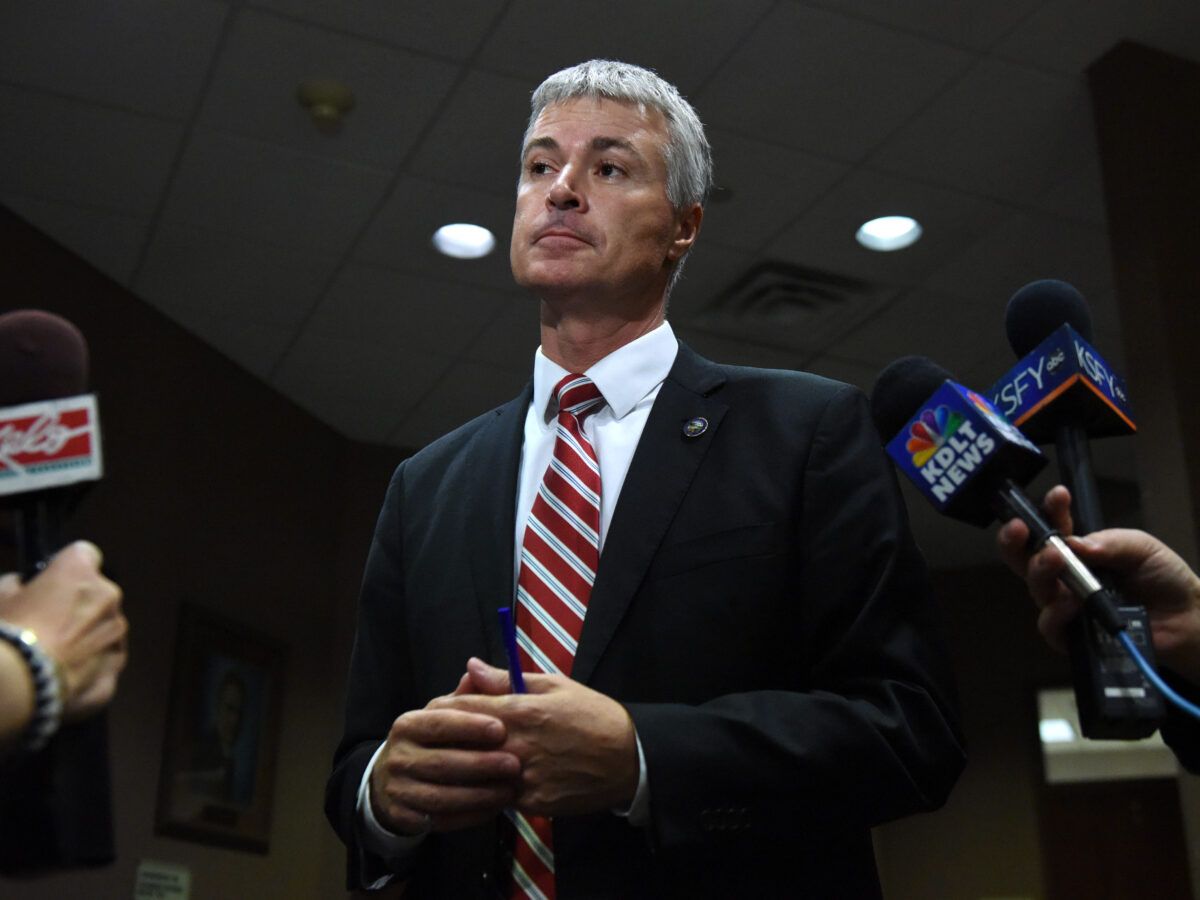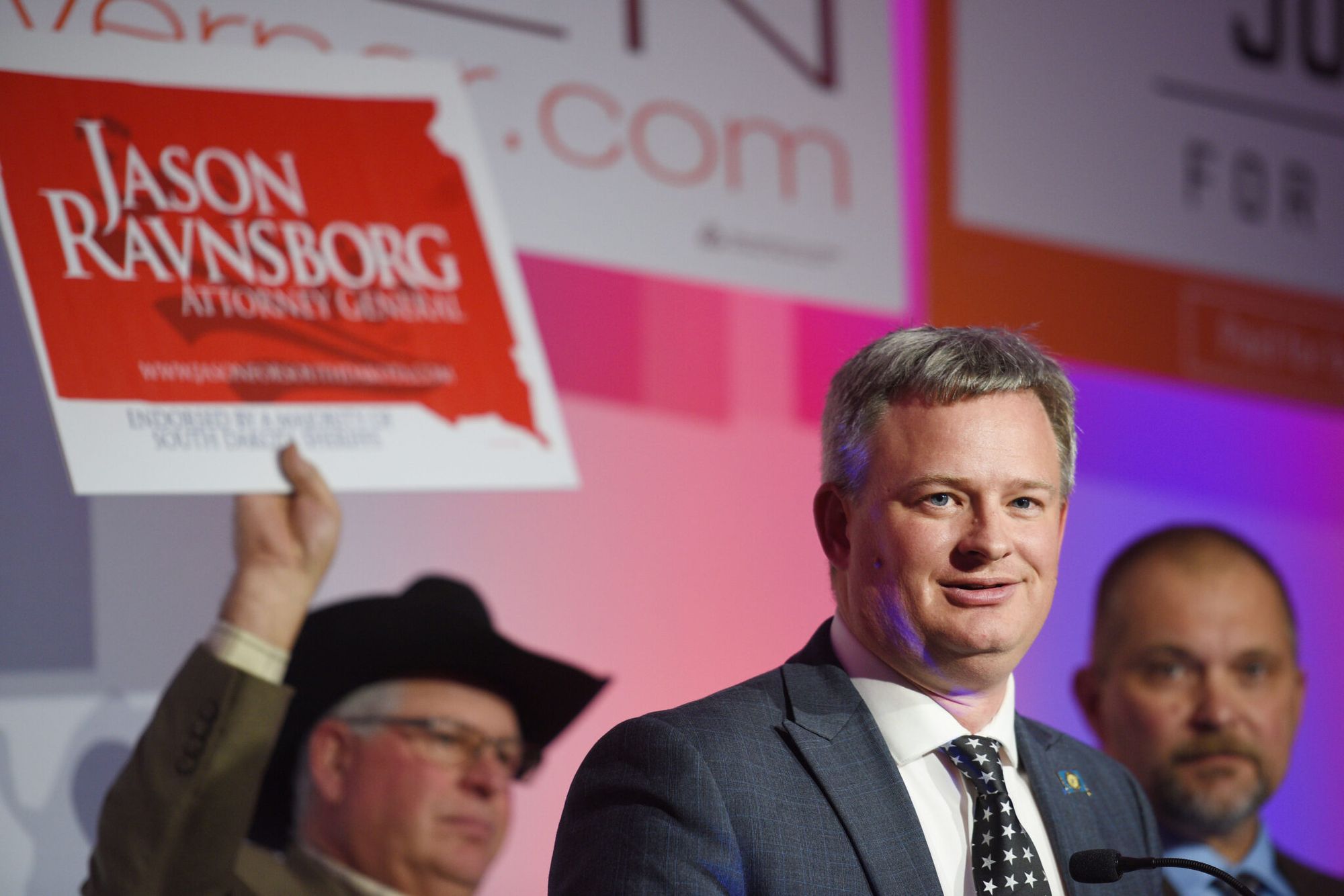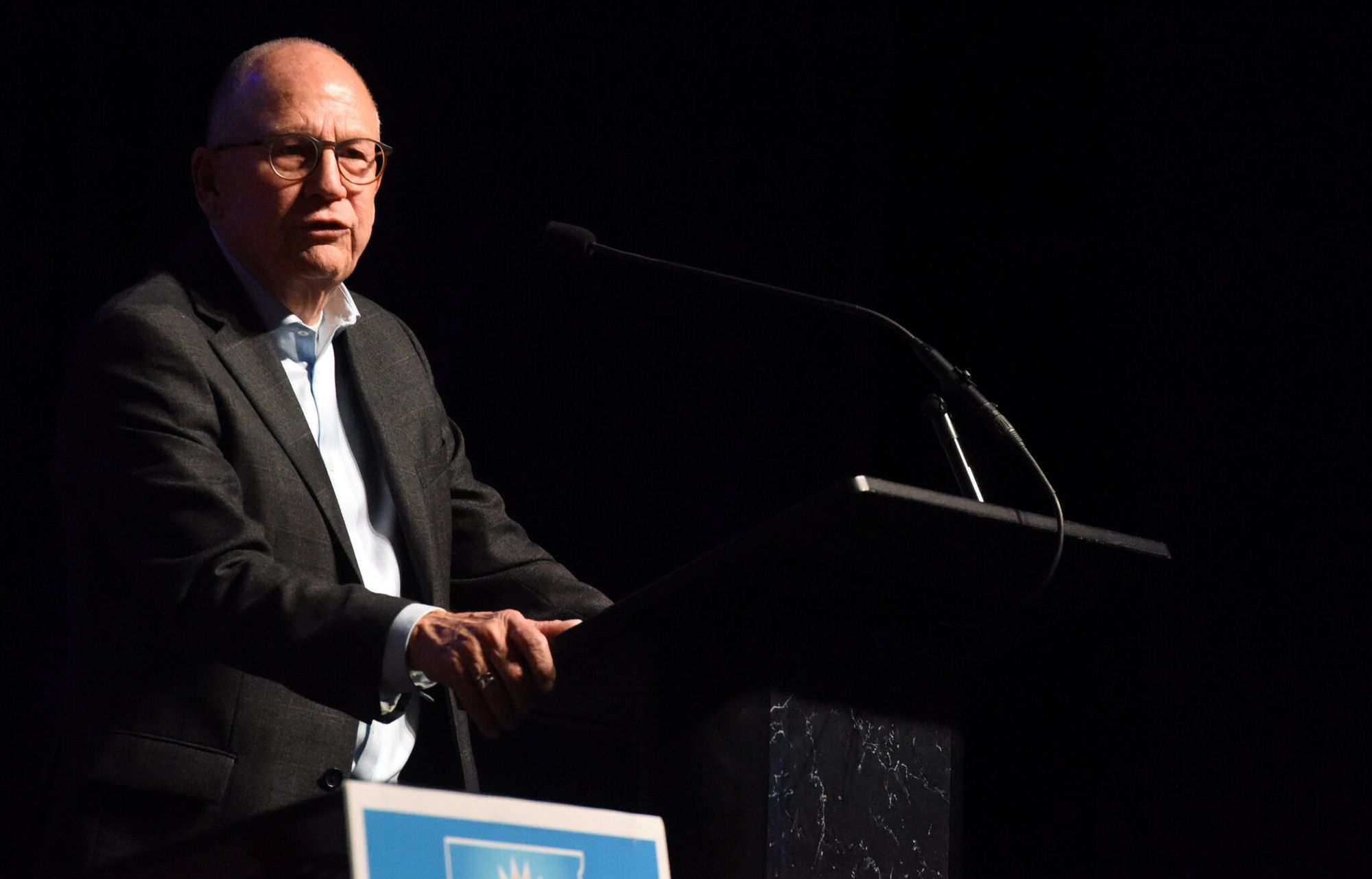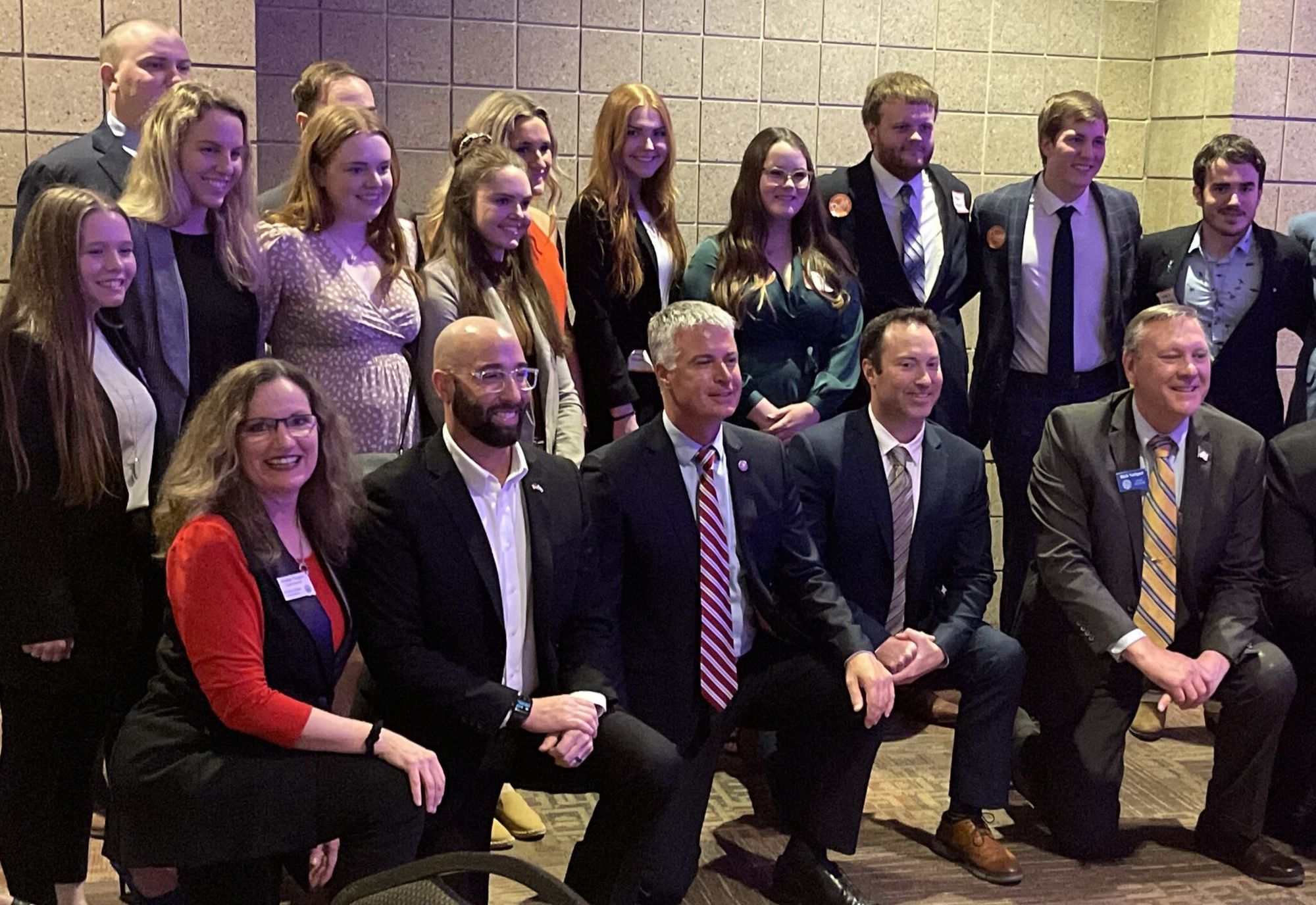South Dakota’s political landscape will enter uncharted territory over the next two months as uncertainty over the Attorney General’s Office tests party loyalties and candidate qualifications heading into the Republican state convention June 23-25 in Watertown.
The question of who will serve as the state’s chief law enforcement official hangs in the balance.
Impeached and suspended Jason Ravnsborg, the incumbent, is working behind the scenes to build delegate support while also preparing for his Senate trial, to be held just days before the GOP convention.
Former three-term Attorney General Marty Jackley has returned to the campaign trail to give the GOP an alternative to the embattled Ravnsborg, forming a political alliance with Gov. Kristi Noem to bolster his case among law enforcement officials and party leaders.
And Democratic Party Chairman Randy Seiler, a career prosecutor and former U.S. Attorney who lost to Ravnsborg in the 2018 general election, has told South Dakota News Watch he will run for Attorney General again – but only on one condition.
“I won’t run against Jackley,” said Seiler. “But if Jason emerges as the Republican nominee, I will run.”
Candidates for attorney general are decided not by voters in the June 7 primary but by delegates at the convention two weeks later, a process that allows political alliances to loom as large as legal credentials or, in Ravnsborg’s case, being the subject of a high-profile criminal investigation.
That creates an interesting timeline, with Ravnsborg’s impeachment trial set to begin June 21. If he’s convicted by a two-thirds majority vote in the Senate, the 46-year-old Iowa native will be removed from office and disqualified “to hold any office of trust or profit under the state,” according to state law.
Anything short of a conviction, however, means he can run again. Ravnsborg has been contacting delegates trying to fend off a challenge from Jackley, who entered the race in March of 2021 and has the support of not just Noem but former attorneys general such as Roger Tellinghuisen and Mark Barnett.
“I would say circumstances caused my phone to ring and email to buzz fairly extensively,” said Jackley, a 51-year-old Sturgis native who would become the first attorney general in state history to return to the office in non-consecutive terms.

Most political observers see Jackley as a clear favorite, with the understanding that strange things can still happen at the convention. Jim Gilkerson, a party delegate who is chairman of the Brookings County Republicans, said he will support Jackley because of “frustration” over Ravnsborg’s legal troubles and the way he has handled them.
Ravnsborg did not respond to an interview request for this story made through his spokesman, Mike Deaver.
“I really like Jason – he’s a personal friend of mine,” said Gilkerson. “But I don’t think it’s going to work for him to be Attorney General after the problems we’ve had. I don’t know how you have something that serious happen and continue, or even want to continue, in that job.”
That’s been a quandary for South Dakota Republicans ever since Ravnsborg struck and killed a pedestrian with his car on a highway west of Highmore on Sept. 12, 2020, setting off 19 months of legal and political controversy, including power struggles within the state’s dominant political party.
Noem pushed for the resignation of Ravnsborg, who pleaded guilty to two misdemeanors and avoided jail time for the crash that killed Joe Boever. Ravnsborg accused Noem of a conflict of interest and seeking more control of the Attorney General’s office. Their feud served as a backdrop to the impeachment process, with House members voting 36-31 against Ravnsborg.
In Ravnsborg’s absence, the office is being run by Deputy State’s Attorney Charlie McGuigan, a veteran prosecutor who “can start the process of restoring trust and confidence in the office,” according to Seiler.
“For the criminal justice system to operate efficiently and effectively, it needs the confidence and trust of the public,” said Seiler. “By not stepping down and continuing to work while being the subject of an investigation, Jason put his own political career and ambitions ahead of the obligations and responsibilities of the Attorney General’s office.”
Does that mean Ravnsborg’s defeat is imminent? Not to some delegates. Spencer Wrightsman, a District 2 Senate candidate and treasurer of the Minnehaha County Republicans, said he has spoken to Ravnsborg and wants to see the impeachment trial play out before deciding on a nominee. He also criticized the decision to hold the trial so close to the convention.
“Due process is a huge deal for me,” said Wrightsman. “I think (the timing) does a disservice to delegates and potentially the candidates because it doesn’t give them time to campaign based on what happens at the trial. I’ve spoken to Jason and messaged Marty a few times, but I’m not in the position to pick one or the other right now.”

Delegates hold key at convention
Concerns about political machinations outweighing legal experience emerged within the party during Ravnsborg’s 2018 campaign. His primary credentials consisted of serving as part-time deputy state’s attorney in Union County – a role that did not include lead trial work – and as a lieutenant colonel in the U.S. Army Reserves.
Ravnsborg’s opponents at the 2018 convention in Pierre were Lawrence County State’s Attorney John Fitzgerald and Fall River State’s Attorney Lance Russell, whose state legislative experience included chairing the Senate Judiciary Committee.
“My analysis was that I didn’t think Jason had ever tried a jury trial, and at the end of the day, I thought I had a good chance, and that John had a good chance because of our experience,” said Russell. “I must say I was surprised that neither one of us did better than we did. I thought the delegates might put a little more stock in experience.”
Each county can be represented at the convention by its party chairman, vice chairman, secretary and treasurer, as well as committeeman and committeewoman. As many as three at-large delegates can be elected in the primary. Precinct committee members can also serve, meaning there are about 2,000 potential statewide delegates.
Ravnsborg, who raised more money than his GOP opponents in 2018, picked up 47 percent of delegate votes in the first round (in which Fitzgerald was eliminated) and 63 percent in a head-to-head matchup with Russell to secure the nomination.
“I have to give credit where credit is due,” said Russell. “Jason ran circles around me in terms of contacts he had with precinct committee people and party leadership, and I think he’s trying to do the same thing this time around. Do I think he can beat Jackley? That’s probably unlikely. But Marty should be making as many contacts as he can.”
In his acceptance speech at the 2018 convention, Ravnsborg pledged to be a “man for all the people” and urged party officials to be united for his cause. But questions about his qualifications lingered into the general election against Seiler, a career prosecutor who served as U.S. Attorney in Sioux Falls from 2015-17.
No Democrat has been elected Attorney General in South Dakota since Kermit Sande in 1972, but two Republicans who held the office – Mark Meierhenry and Tellinghuisen – crossed party lines to endorse Seiler in 2018.
“I was looking at it purely from a non-political standpoint,” said Tellinghuisen, who served as Attorney General from 1987-91 and now works in private practice in Rapid City. “I thought Randy had far greater experience as a prosecutor than Ravnsborg, and it was better to have someone with that background in the position.”
Asked if he received blowback for going against the Republican nominee, Tellinghuisen laughed and said, “Nobody spray-painted my house or anything. I’m sure there was gnashing of teeth when I made the endorsement, but nobody reported that to me directly.”
Ravnsborg received 55 percent of the vote to defeat Seiler, taking office in January 2019. The fatal crash came less than 20 months later, and Tellinghuisen is careful to separate Ravnsborg’s job performance before the incident from the tumult that followed.
“I believe that the events that led us to this point had little or nothing to do with the actual performance or duties of the attorney general,” said Tellinghuisen. “Whether or not these events have undermined public confidence in the office, I think that’s a fair question.”
Seiler contends that Ravnsburg remaining in office during the probe put the state’s attorneys overseeing the case in a difficult spot, and that a state grand jury or special prosecutor should have been appointed to impartially review the “totality of circumstances” – meaning Ravnsborg’s actions before, during and after the crash.
Asked whether he feels vindication as the impeachment trial approaches, Seiler dismissed that characterization.
“I don’t think vindication is the right word,” he said. “With respect to Joe Boever’s family and the circumstances of what happened, and Jason’s refusal to accept any responsibility for his actions, I think it’s a tragedy. It harkens back to the notion that democracy works best when there are two vital, engaged political parties, and people understand that the decisions they make when they go to the polls have real and lasting consequences.”

Jackley gets back on campaign trail
The art of political persuasion was on full display at the Brookings/Moody County Lincoln Day Dinner on April 22 at the Swiftel Center, where attendees could bid on a hatchet signed by U.S. Rep. Dusty Johnson, chat with SDSU College Republicans and scan literature from Americans for Prosperity near the entrance.
Noem received a standing ovation; Johnson spoke of a coming “red wave” in November – which his primary opponent, Taffy Howard, insisted would not include Johnson; and Jackley self-deprecatingly observed that A.G. stands for “Almost Governor,” drawing a laugh from the gathering of party officials, candidates and donors.
When the speeches ended, Jackley took a group photo with the College Republicans and then worked the crowd, engaging in private chats with known and potential delegates until much of the room had emptied. His ride for the night was Barnett, the former three-term attorney general and circuit judge who hired Jackley to help with Rapid City drug prosecutions in the 1990s.
Barnett considered running for AG this cycle until Jackley entered the race, at which time Barnett endorsed his longtime associate. That trend continued with 59 state’s attorneys and 64 sheriffs supporting Jackley at a critical time for the state’s top law enforcement office. Jackley refers to Ravnsborg’s legal and political entanglements obliquely as “circumstances” or “all that has gone on” while not denying that they spurred his return.
“The messages that I got asking me to run were humbling,” he said in an extended interview with News Watch. “But it’s always been in the back of my mind. You can tell by the fact that I’m pulling old ‘Jackley for Attorney General’ signs out of my barn that I’ve never ruled it out. With all that has gone on, though, there’s a higher level of encouragement.”
The former U.S. Attorney doesn’t complain about having to woo party insiders, though this is the first time he’s entering a potentially contested attorney general convention race. He points out that he has at least two votes locked up because his mother, JoAnn, and son, Michael, will serve as delegates in Watertown.
Jackley has felt the pressure of having to fund a statewide campaign in a race decided at the polls. He had trouble keeping pace with the war chest amassed by Noem in their 2018 gubernatorial primary battle, in which Noem captured 56 percent of the vote.
“There are candidates that have the ability to raise money outside of South Dakota, and I’m not one of those candidates,” he said. “Part of it was my makeup and part of it was just reality.”
Jackley was endorsed in the upcoming attorney general’s race by Noem in February, benefitting from her bad blood with Ravnsborg. He returned the favor by supporting her re-election bid. Jackley insisted that if he wins, the political alliance won’t compromise his ability to properly scrutinize or investigate all facets of state government in Pierre.
“Going back to when I served under Mike Rounds and Dennis Daugaard, you don’t always agree on policy matters,” he said. “It’s important to remember that your role is to be chief legal advisor and not chief policy maker, whether it’s legislative body, judicial or executive, and make sure they’re staying within the bounds of the law.”
As he and Barnett headed to their truck in the parking lot following the Lincoln Day dinner, Jackley admitted to feeling “confident” about his election prospects, with the caveat that strange things can happen at the convention. Tellinghuisen, who defeated Jackley’s father, Mike, at the convention to earn the 1986 nomination, said the unlikely result of Ravnsborg pulling off a victory would put Republicans in a tough spot looking ahead to November.
“If Jason were to get the nomination, I’d have to take a look at the Democratic nominee,” said Tellinghuisen. “But I’d like to believe whoever gets elected does so because they’re viewed by the public to be the best attorney candidate, not necessarily the best politician candidate.”





